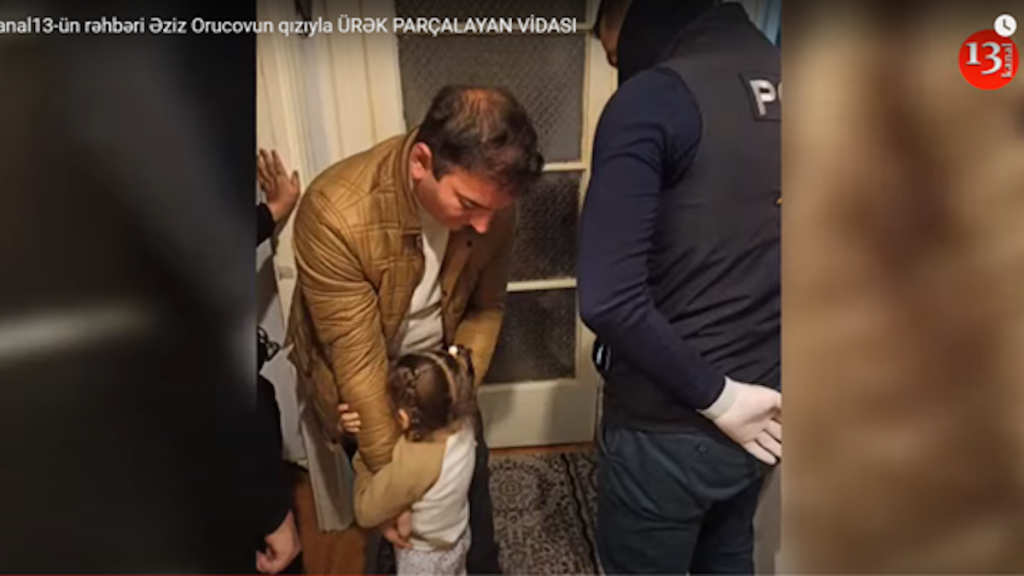In the last two weeks, four journalists associated with critical news platforms have been arrested in Azerbaijan. Aziz Orujov, director of the popular television channel Kanal 13, is the latest to be detained amid rising tensions around the Nagorno-Karabakh conflict between Azerbaijan and Armenia.
A Baku court ordered Orujov — who was previously jailed in 2017 — to be held in pre-trial detention for three months on charges of illegally building on land that was not registered in his name. His lawyer Bahruz Bayramov, told CPJ that this is a common practice in the city, and believes the charges were prompted by Orujov’s journalism. Bayramov also said that the detention has no legal basis under the charges.
Alasgar Mammadli, the head of Media Rights Group, a press freedom organization in Azerbaijan, said that the authorities’ decision to target the head of a popular and critical media platform on these grounds heralded “a new wave in the witch hunt against journalists” in Azerbaijan.
💡 Last week, three journalists from the anti-corruption outlet Abzas Media were ordered detained for four months on charges of conspiring to bring money into the country unlawfully. And on November 28, Azerbaijani authorities accused U.S., German, and French embassies and organizations registered in those countries of unlawfully funding the outlet.
- CPJ and partners call on U.S. Secretary of State Blinken to designate RFE/RL’s Alsu Kurmasheva “wrongfully detained” by Russia; Moscow also extends U.S. journalist Evan Gershkovich’s detention by two months
- CPJ joins letter on Egyptian writer Alaa Abdelfattah to the UN Working Group on Arbitrary Detention, supporting a submission that his continuing detention is arbitrary and contrary to international law.
- Burkina Faso conscripts two journalists critical of junta, another fears kidnapping
- Indian journalist Rejaz M Sheeba Sydeek faces criminal investigation for report on anti-Muslim bias
- Bangladeshi journalist Md Nahid Hasan attacked while reporting on a political clash
- CPJ calls for Brazilian journalist Schirlei Alves to be spared jail over rape trial report
- “I’ll be killed if they find me”: Radio reporter Maxo Dorvil flees Haiti amid gang violence
Spotlight
The Israel-Gaza war has taken a severe toll. Never have so many journalists been killed in such a short period in a single conflict since CPJ began documenting journalist fatalities in 1992.
As of November 30, at least 57 journalists and media workers had been killed in the region since the war began on October 7. In comparison, CPJ recorded 42 journalists killed worldwide in connection with their work in all of 2022.
➡️ Explore the interactive version of CPJ’s map of killed journalists on our website.
➡️ CPJ is also documenting the increasing number of journalists being targeted while carrying out their work in Israel and the two Palestinian territories, Gaza and the West Bank. These include 19 arrests, as well as numerous assaults, threats, cyberattacks, and censorship.
➡️ Review our safety advisories for journalists covering the war and mental health resources for journalists.
➡️ Explore images of journalists working under extreme, heartbreaking, and sometimes fatal circumstances to cover the fighting.
A closer look
This week, CPJ welcomed the overdue conviction of a former state security agent for the torture of Colombian journalist Claudia Julieta Duque. Ronal Harbey Rivera Rodríguez, a former detective of the now-defunct state intelligence agency Department of Administrative Security (DAS), was sentenced to 12.5 years in prison.
Carlos Martínez de la Serna, CPJ’s program director, called the conviction “a necessary victory against impunity in crimes against journalists in Colombia.”
A court declared Rivera guilty of psychologically torturing and harassing Duque, making intimidating phone calls, and spying on the journalist between 2001 and 2004 in retaliation for Duque’s reporting on the 1999 murder of journalist Jaime Garzón.
🔎 For more, explore Fundación para la Libertad de Prensa (FLIP)’s reporting on the decades-long campaign of intimidation and harassment against Duque and her family from 2001 to 2016.
What we are reading
- African media houses must do more investigative reporting to stay relevant — Patrick Egwu, Nieman Journalism Lab
- In the shadow of violence: The pressing needs of Sudanese journalists — Leila Bendra and Dominik Lehnert, Media in Cooperation and Transition
- In Georgia, ‘journalism is no longer considered safe’ — Anja Koch, Deutsche Welle
- After 658 days in jail, Kashmir journalist Fahad Shah shares his story — Aakash Hassan, Christian Science Monitor
- Why can’t Mexico stop the killing of journalists? — Joel Simon, Columbia Journalism Review
- The Israeli government has Haaretz newspaper in its sights as it tightens the screws on media freedom — Colleen Murrell, Nieman Journalism Lab
